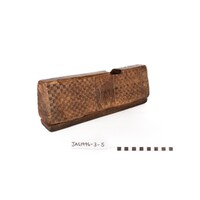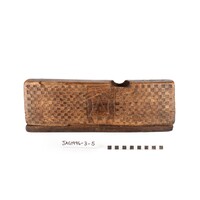Isigqiki
Metadata
Isigqiki
[ Source of title : Debra Pryor for FHYA using JAG catalogue card ]
Object
JAG 1996-3-5
Creative Commons License: CC BY-NC-ND https://creativecommons.org/licenses/by-nc-nd/4.0/
Description [Source - Debra Pryor for FHYA, 2022, using spreadsheet created by Nessa Leibhammer for the South African Heritage Resources Information System (SAHRIS), from JAG materials in 2015: Object description: Rectangular block-like headrest tapering towards the top with a flat plank attached to the base. There is a section gouged out of the upper surface- possibly the result of a burn and a portion chipped away along one the edge. One side is covered with a checkerboard design with aslightly sunken central panel in which a silhouette of a woman has been carved in relief. The whole surface is scratched. Object form type: headrest; Object material type: wood; Technique: carving, pokerwork; Colours: Brown, black; Dimension comment: ; Object age: early to mid 20th century; Production place: KwaZulu-Natal; Cultural association: Northern Nguni; Place of use: KwaZulu-Natal; Provenance: .]
Transcription [Source - Debra Pryor for FHYA, 2023, from headrest archive file: Provenance: 1. Mrs Duduzi/Manzimande who got it from her mother who got it when she married in 1930's. 2. Prof Frank Jolles] Attributions and conjectures [Source - Nessa Leibhammer for FHYA, 2017: Comments on classification: In his 'A Preliminary Survey of the Bantu Tribes of South Africa', Union of South Africa, Department of Native Affairs, Ethnological Publications, Vol. 5, Pretoria, Government Printer, (1935): 7, 70-83, national government ethnologist, Nicholas Van Warmelo did not use the term "North Nguni". He grouped people living both north and south of the Thukela, under one umbrella term, "Natal Nguni", based on linguistic affinity. His classification was adapted by the ethnology curator, Margaret Shaw, in her 1958 "System of Cataloguing Ethnographic Material in Museums" which determined that items from the region were to be classified as "Natal Nguni: Zulu and others (not differentiated)." According to art historian, Anitra Nettleton, the classificatory system used by art galleries and museum shifted from Shaw's model to the one where "Natal Nguni" fell away and was replaced by "North/Northern Nguni" for KwaZulu-Natal and Swaziland because scholars found it difficult to distinguish items from adjacent areas, or emigrant people from those from the KZN region. Scholars working with the JAG materials used broad ethno-linguistic categories (Zulu, Xhosa, Tsonga, Shona, Sotho, Tswana) to identify the makers/users of the objects, all of which came to JAG without much by way of provenance, and identification was based on factors such as object type, materials, formal composition, style and surface patterning (emails A. Nettleton to N. Leibhammer, 25 and 28 November 2014).]
| Event Actor | Event Type | Event Date | Event Description |
|---|---|---|---|
| Five Hundred Year Archive (FHYA) | Online curation | 2023- | |
| South African Heritage Resources Agency (SAHRA) | Digitisation | c.2015 | |
| Johannesburg Art Gallery (JAG) | Custody | 1996 | |
| Johannesburg Art Gallery (JAG) | Purchase | 1996 | |
| Frank Jolles | Collection | [19-?] | |
| Unacknowledged | Making | early to mid 20th century |
If you have difficulty accessing the objects, use these links.


Contributions